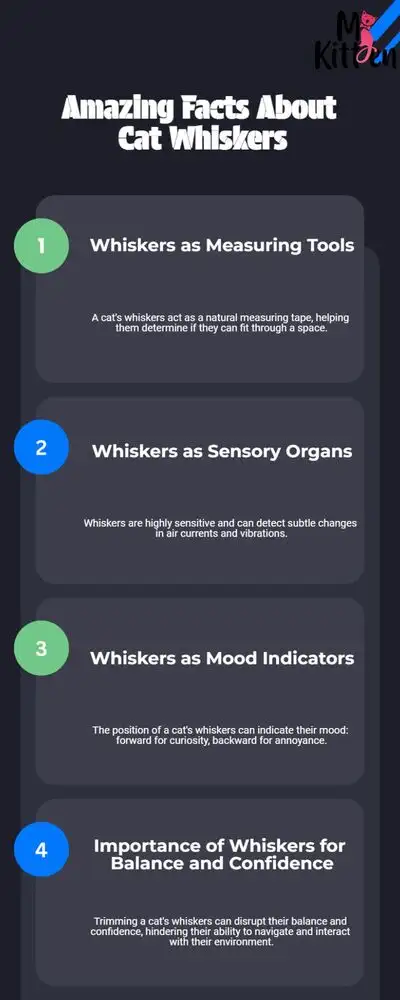Ever wondered why cats have whiskers?
Whiskers aren’t just cute decorations—they’re tiny super sensors!
These sensitive strands help cats measure spaces, detect air currents, and even express emotions. Whether they’re hunting their toy mouse or navigating in the dark like a ninja, whiskers are their secret weapon!
What makes whiskers a part of the feline’s anatomy? Also while certain supremely adorable felines have moustache as magnificent as the great Victorian gentleman, there are several more who have sweet and short whiskers, but the baffling question that yet remains unanswered is that why do cats even have whiskers?
Feline Whiskers aren’t just cute—they’re a built-in GPS, mood detector & survival tool!
What makes cat whiskers a part of the feline's anatomy?
Your cat’s whiskers help them sense movement, navigate tight spaces, and even detect danger before you do.
So, the next time your cat twitches those whiskers, remember—you’re living with a tiny, furry superhero!
Cats ergo use their majestic whiskers to navigate through their eclectic surroundings.
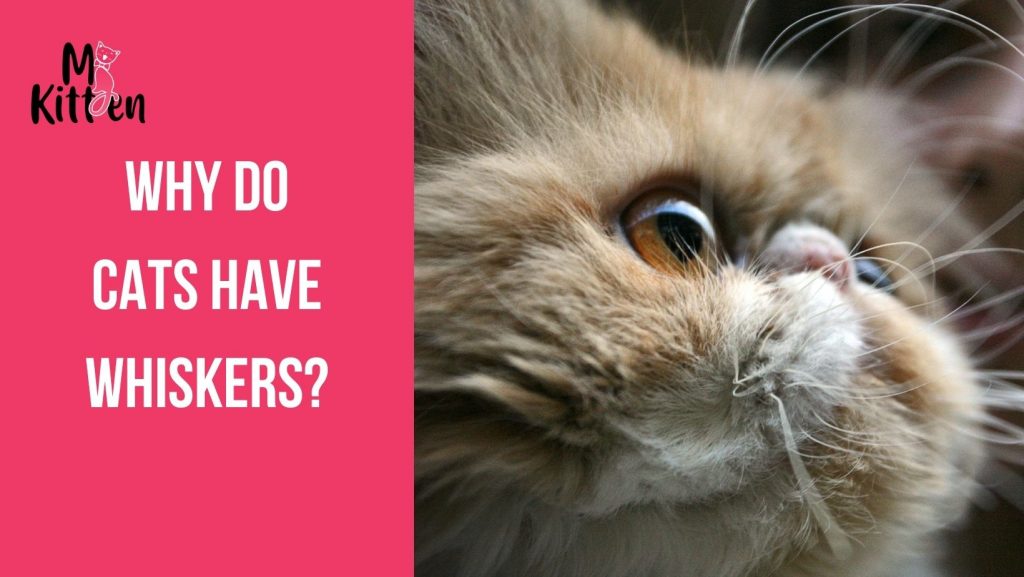
The only thumb rule is to be patient! Good Luck!
Following are the mind- boggling reasons why your cat has whiskers?
A cat’s whiskers are absolutely multifunctional, and are an indispensable part of a cat’s anatomy. The most cardinal function of a cat’s whiskers is as a sensory tool. The very word ‘whiskers’ has its primary genesis from a Latin word, that is ‘vibrio’, which means to vibrate, and you would be surprised to know that the minuscule tip of a cat’s whiskers has a sensory organ that is known as a proprioceptor, and also the invisible nerves are abundantly loaded in a cat’s hair follicle.
Cats use their whiskers as vital sensory tools to scan and understand their surroundings. These sensitive strands detect even the smallest vibrations, making cats highly aware of their environment.
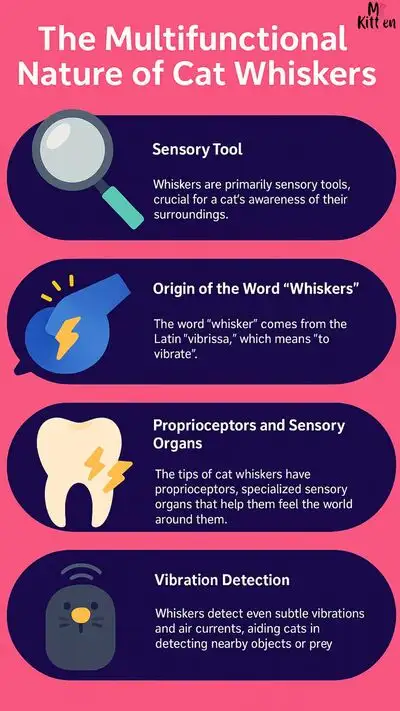
Mind-Blowing Whisker Facts!
Natural measuring tape – if the whiskers fit, the cat fits!
Hyper-sensitive radar – detects even the smallest air changes!
Mood indicators – forward = curious, backward = annoyed!
NEVER trim them – it messes with their balance & confidence.
Whether navigating, hunting, or showing their moods, whiskers play a key role in a cat’s life. Whether they’re squeezing into tight spaces, sensing tiny movements, or perfecting their midnight zoomies, whiskers are their superpower!
It is also rightly said that an animal has six senses because your munchkin’s tender whiskers are capable of fathoming even the vibrations in the thin invisible air. A cat’s whiskers can detect the smallest of directional change in an air breeze.
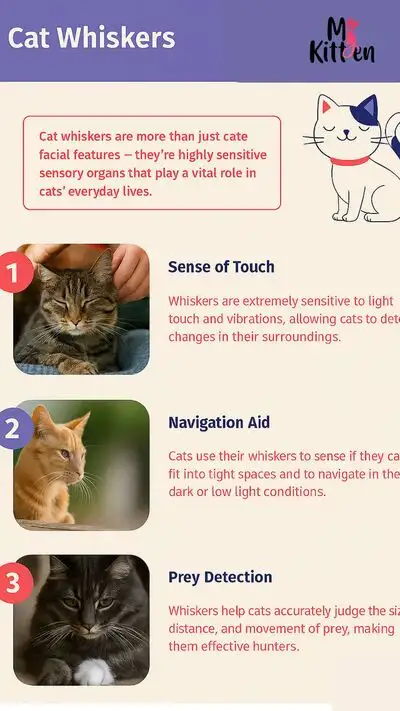
Whiskers as Sensory Tools for Cats
Whiskers Detect the Smallest Vibrations
Cats have a unique sixth sense—thanks to their whiskers, they can detect even the slightest vibrations in the air. A cat’s whiskers can sense directional changes in air currents, helping them gauge their surroundings with precision.
Whiskers Help with Distance Measurement
Whiskers are essential for navigation. Cats use them to measure distances and assess whether they can fit into tight spaces. Their long whiskers also assist in tracking prey, acting as a built-in radar.
Whiskers as Sensory Tools for Cats
Whiskers Detect the Smallest Vibrations
Cats have a unique sixth sense—thanks to their whiskers, they can detect even the slightest vibrations in the air. A cat’s whiskers can sense directional changes in air currents, helping them gauge their surroundings with precision.
Whiskers Help with Distance Measurement
Whiskers are essential for navigation. Cats use them to measure distances and assess whether they can fit into tight spaces. Their long whiskers also assist in tracking prey, acting as a built-in radar.
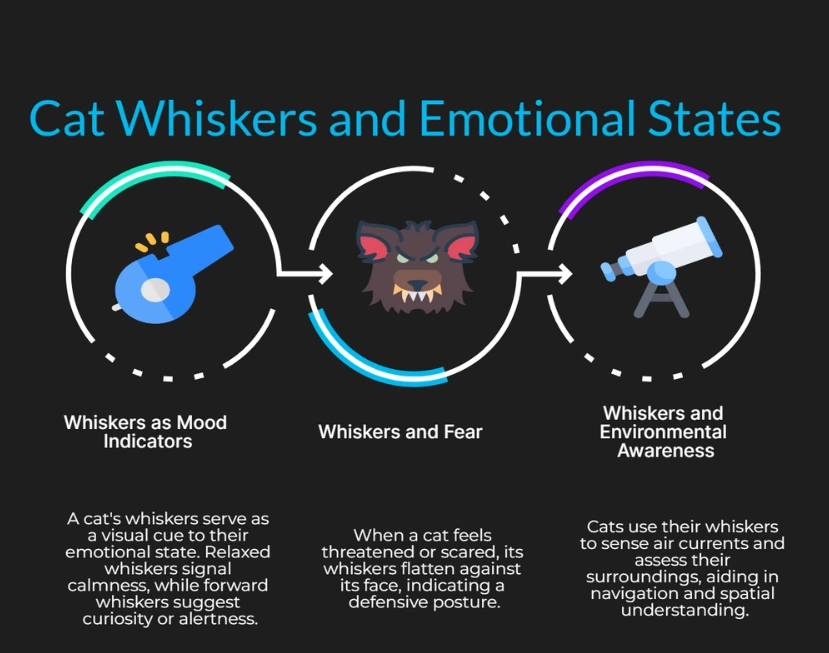
Do Whiskers Help Cats See in the Dark?
Yes! Whiskers act as night vision aids, allowing cats to move smoothly in complete darkness. Since their close-up vision is not very strong, whiskers help them detect objects in their path and avoid obstacles without relying solely on sight.
Whiskers for a cat are hence of paramount importance as it not only helps them scrutinize their immediate surroundings, but it also helps your kitty measure distances, and her long whiskers even helps her in chasing down preys. These whiskers hence act as a cat’s puissant radar that assist them in sensing the most unpredictable.
How Many Whiskers Do Cats Have?
A cat has 24 whiskers, evenly distributed in two symmetrical sets on their muzzle. This equal distribution helps them analyze their environment accurately.
Whiskers act as a protective barrier for a cat’s face and eyes. The whiskers near their eyes detect even the tiniest touch, helping them avoid potential injuries from sharp or hazardous objects.
Whiskers act as a knight on a white charger for your sweet kittens who literally have these whiskers as a night vision aid, and its the whiskers that helps your sweet kitty smoothly move around, without bumping or falling into anything during the dark nights. Also unlike what we think, a cat’s close up vision isn’t great and they can hence not easily see anything that is less than 30cms ahead of them.
Do Whiskers Reveal a Cat’s Emotions?
Yes, a cat’s whiskers can indicate their mood:
Relaxed whiskers – The cat is calm and content.
Whiskers pushed forward – The cat is curious or alert.
Whiskers flattened against the face – The cat feels threatened or scared.
Also air currents of a room are absolutely different at different places, depending on where the household furniture is placed, and it is by virtue of these powerful whiskers that a cat can evaluate her immediate surroundings along with the air currents, and these whiskers even detect and tell her smart brain as to where things are.
Why Should You Never Trim a Cat’s Whiskers?
Whiskers are vital for a cat’s well-being. Trimming them can cause:
Disorientation – Cats rely on whiskers to navigate their surroundings.
Stress and anxiety – Without whiskers, cats may feel insecure and confused.
Difficulty in movement – Lack of whiskers affects balance and coordination.
A cat’s whiskers naturally grow back if they fall off, but trimming them can be harmful!
Final Thoughts: Whiskers Are Essential for Cats
Whiskers play a crucial role in a cat’s daily life—helping them sense their surroundings, measure distances, and stay safe. As responsible cat parents, we should never cut or trim whiskers and allow our feline companions to use their natural sensory tools.
For any questions about your cat’s behavior or well-being, feel free to reach out to our expert cat behaviorists at MyKitten!
A kitty’s whiskers also act as a buffer to protect the sensitive spots such as her face and her charming eyes from any sudden injuries. The whiskers that your furball has around her eyes respond to the most tiniest of touch, and these whiskers immediately detect all sharp or perilous objects around, thereby rendering the mandatory protection to a cat’s eyes and face. Whiskers are considered absolutely brilliant in helping a kitty understand how tiny or small any space is.
Whiskers can also give us an insight of how our kitty feels, it helps us understand her demure and usually shy, introvert nature. If a kitty’s whiskers are in their innate position, and not spread across her face and cheeks, that signifies that your kitty is calm, and content, and is feeling relaxed. However on the contrary, if your beloved cat’s whiskers are spread all her face, this alludes to the fact that she might be feeling threatened, and is intimidated by some object, certain change, another new pet animal or as a result of any such unsolicited intrusion in her.
We also have breeds like Persian, Ragdoll, Maine Coon, Siamese, Exotic Shorthair, Bengal, and British Shorthair.

